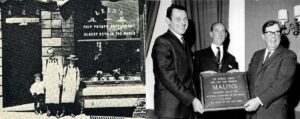On more than one occasion in my writing, my Food Talks, and my tours in Machane Yehuda Market, I have repeated the statement that Fish and Chips, the great British favorite, was actually invented by a British Jew. I had read about this in multiple places, and it seemed legit to me.
Then, a few weeks ago, I saw a story published online (repeated shortly thereafter by many other articles) under the title, “No, British Fish and Chips is Not a Jewish Invention.” And the article was written by Barbara Kirshenblatt-Gimblett, a Jewish Food History scholar who I respect deeply. I therefore felt the need to take this seriously, and look into it more.
So what’s the deal? Did a Jew invent Fish and Chips, or not? Before digging deeper into that, I want to step back for a moment.
On Culinary Mythology

Myths are everywhere in the world of food, like weeds in an untended yard. From when or how a dish was invented, to the meaning or source of a food’s name, to the idea of one culture “owning” a food to the exclusion of another, these oft-repeated stories and “backsplanations” satisfy readers but are often untrue. In fact, a new book that I’m excited to read (I have it on order) debunks a number of those myths, specifically about national dishes.
The Oxford Companion to Food even has a full-page entry on the topic of culinary mythology. Separately, I have frequently highlighted some such culinary myths that aren’t truly accurate.
But to my mind, the purpose of “debunking” these myths is not an end in itself. It can even be counterproductive, as I found when someone reacted in a hurt manner to one of my posts, due to his emotional attachment to something I said was not likely true. What good did that do? So I often tread more lightly now. Still, one shouldn’t repeat stories or claims that are false.
Which brings me to a final point of introduction. It is very difficult to prove when or how something happened. It is somewhat easier, at times, to prove something is wrong. For example, if a food has a commonly quoted origin story, but we can find proof of its existence before the time of that story, you know the story is false. It is not as simple to prove that an origin story is actually true, as most things aren’t documented at their moment of conception.
But even you can’t prove the veracity of such an origin, you can still (and should, in my opinion) judge whether a story is plausible. In my book about Shabbat stews, a few surprising questions crop up regarding the dish in some places. Due to the book’s historical nature, and the oral transmission nature of cooking recipes, often those questions are impossible to answer with certainty. So based on the surrounding evidence that does exist, I try to provide the most logical explanations. Avoiding them instead would weaken the overall project, since these questions are significant enough that their answers matter to my subject.
So What About Fish and Chips?
Returning to the recent article, what does Kirshenblatt-Gimblett say about Fish and Chips (“F&C” hereafter)? The article starts with the claim that the fish in the F&C combo is Sephardic in origin. Kirshenblatt-Gimblett identifies the source of this belief in an essay by historian Cecil Roth. She then goes on to point out the difference between the fried fish that Sephardic Jews ate (floured, and typically eaten cold) and the version that appears in the F&C dish (battered and hot). Further, she indicates a widespread awareness of the Sephardic type of fish among other communities, as well as versions that long predate our stay in Spain. Similarly, she points out other early references to battered fish that are not identified specifically as Jewish.
I am summarizing her evidence in brief here, but please read the article for greater detail. However, her final remarks should explain the upshot:
What distinguishes fish in the “Jews’ way” is not only dredging it in flour and frying it in oil, but most importantly, eating it cold and according it pride of place on the Sabbath table. The fried fish in British fish and chips is a different dish. The fish is battered, it may be fried in beef tallow, lard, or oil, and it is served piping hot…. Their different histories have been conflated to produce the oft-repeated Jewish origin of British fish and chips.
I wanted a bit of clarity, so I reached out to Kirshenblatt-Gimblett. As it seemed to me, her article basically debunked the idea that the fish in the combo dish was Sephardic-Jewish in origin, but said nothing about who invented the combo. Did Joseph Malin, recognized by the National Federation of Fish Fryers as the food’s creator, actually invent it? Or was she claiming that as false as well?
Kirshenblatt-Gimblett repeated what she had once told me previously when I asked her thoughts on a different dish. She vehemently believes that digging into the origin of a dish is a dead-end activity, a wild goose chase through which we can never reach certainty. Furthermore, she told me that focusing on such questions actually hurts us, by distracting from more important questions. For example, in this case, what was the Jews role in the fish trade in general in 19th century London, and in particular as a street food? Since this dish, from its outset, was enjoyed by many people, how did it come to be associated with Jews? Why is the dish most commonly fried in oil in London but in beef tallow in the north of England? And more.
So she strongly objects to even asking the question of whether or not a Jew invented this beloved dish. Trying to figure that out is not even worth exploring, because we will likely never find distinctive proof one way or the other.
So Where Does That Leave Us?

I agree that it is highly unlikely we will ever know with certainty whether or not Joseph Malin (or some other Jew) was the first to create this food. In fact, there is a competing claim that a non-Jewish man named John Lees invented it in Lancashire. Maybe they both invented it. Maybe they each invented something similar with slight differences (parallel developments happen all the time in culinary history). Maybe Lees invented it, and Malin did not. Maybe Malin did invent it. Or maybe someone else did.
Unlike the Shabbat stew questions I had, this one is less important to me. I am not writing a history of this dish at this point, so who actually invented it is not all that relevant to me. I have… ahem… bigger fish to fry! The idea that Malin invented it was an interesting tidbit, which is why I repeated it. But if I learned with certainty that he did not, I couldn’t really care less.
If I wanted to dig down into it more, I would start by following up with the Fish Fryers association to see what their sources were. Because for me, up to the point of reading Kirschenblatt-Gimblett’s article, that was the strongest source for the claim, but one that I hadn’t dug into. I just assumed that they had done their due dilligence, making the claim plausible. But perhaps they did not. Maybe they had some other reason to recognize Malin rather than Lees as the creator of the dish (or to leave it as an unanswered open question). Was there perhaps some kind of politics involved in their decision? Or was there oral history, or some other source? (John Walton, who actually wrote a comprehensive book on F&C may in fact have done this. But I have not yet read his book.)
It is also conceivable that the F&C we know today is different than what it was when it started becoming popular in the 1860s. Maybe originally it was floured, not battered. Maybe some people floured it while others battered it, perhaps even in different areas. But as with the origin question, we also will not likely know how the dish changed from its earlier iterations. Could a Jew have invented fish and chips? It is certainly possible, but without further evidence (which I have not searched for, but Walton presumably did), the claim appears little more than speculation. No way to know whether it was, or was not, invented by Joseph Malin. So I can’t and won’t try to give you an answer to this blog post’s title question.
At the same time, I still have a problem with the article’s headline. It doesn’t accurately portray what Kirshenblatt-Gimblett wrote. Her article didn’t address the claim of Malin inventing F&C (because, as she explained, she doesn’t even look at such questions). As Kirshenball-Gimblett told me, she didn’t claim (as the headline states) that Jews didn’t invent fish and chips, because “We do not know and will likely never know.” So I found the headline (presumably written by an editor at the publication) sensationalist and click-baity. A mild form of a different culinary myth.
So, in the end, why did I write this post at all, if I’m not providing you with an answer to the question? First of all, as a mea culpa for repeating a claim that may not be true. But moreso, because hopefully it helps you better understand the idea of how culinary mythology happens, and what the problems with it are. While the F&C origin story remains what it first was to me — an interesting tidbit — it is now one that I can no longer (and therefore won’t) quote with any degree of honesty. At best one can say, “A Jew was recognized by an industry organization as having invented it.” But really, does that even matter?







What Do Chili con Carne, Fish 'n' Chips and Foie Gras Have in Common? - Taste of Jewish Culture
[…] Subsequent to writing this post, I came across further information. Please read this follow-up post as […]
Sterling Archer
TL;DR Just another hit piece justifying cultural appropriation and another Zionist trying to steal another country’s cultural identity and cuisine to retcon a national identity for baby killers. Now that they’ve stolen sunchokes, Pearl couscous tabbouleh, hummus, shakshukah, falafel, shawarma, knafeh, baklava, couscous, maftool, baba ghanouj, amba, kubbah, arook, kibbeh….all levantine dishes invented by Arab Muslims that are passed off as “Israeli food”. My favorite Israel dish…it’s a tie between sushi burritto, Buffalo chicken wings, and lamington